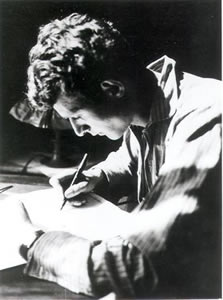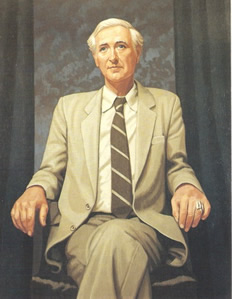De Engelse dichter, essayist en schrijver Stephen Spender werd geboren op 28 februari 1909 in Londen. Zie ook alle tags voor Stephen Spender op dit blog.
Uit: World within world
„During these months, a most poignant event, the suicide of Virginia Woolf, was observed by me as through a thick pane of glass, seen very clearly, but all sound shut out: the personal tragedy seen through the vast transparent impersonal one.
For the time being, the only hope was that the current of power should be reversed and turned back on those who had first employed it: that the pendulum of the bombers, swinging over us, should swing back again over Germany. Yet to admit this was an admission of spiritual defeat: for it was to say that hope lay in power, in opposing despair with despair. We said this, with the result that we are still saying it. All this has implied the surrender of the only true hope for civilization—the conviction of the individual that his inner life can affect outward events and that, whether or not he does so, he is responsible for them.
From now on, the fate of individuals was more and more controlled by a public fate which itself seemed beyond control. For control implies not merely putting a machinery into motion, but also being able to make it stop: modern war is a machine easy to make start, but it can only be stopped at the moment when it has destroyed or been destroyed by another war machine. Control means being able to relate a programme of action to the results of that action. Now we had arrived at a stage when a large part of the resources of great nations were poured into programmes of which no one could foresee the results. All this was only leading to subsequent plans for making atomic and hydrogen bombs to defend East against West or West against East in a meaningless struggle between potential ashes to gain a world of ashes. For, in the course of the struggle, the vast “machinery of production,” together with its capitalist or proletarian owners, and all the sacred theories of whichever class, would be as outmoded as its own ruins, like the civilization and theories of Babylonian astrologers.
That part of living which was devoted to spiritual and personal values, became a marginal activity in society, and for individuals a side-line, unless they happened to be old, sick, or socially unreliable. The most serious result was the effect on the minds of individuals, particularly the young, who found themselves in a world where no action of theirs, and nothing they created or thought, could alter the course of events. Here, though, on the level of thought and spiritual life, was the real challenge. For it is intolerable that men who, with their minds, have invented machines of destruction, and in their policies made themselves the half-slaves of these machines, should not be able to unthink what is a product of their intellects.“

In 1932
De Belgische-Franse dichter, schrijver, essayist, dramaturg en scenarioschrijver Luc Dellisse werd geboren op 28 februari 1953 in Brussel. Zie ook alle tags voor Luc Delisse op dit blog.
Tu es là
Tu es là, avec les yeux tournés vers la lumière
Je vois ta nuque, tes épaules rondes et nacrées
Et je vois le reflet de ton regard dans la trouée
Des nuages et dans le masque du soleil.
Je tire à moi lespace en respirant entre mes poings
Je tourne dans un grand vent de papier qui se lève
Je gagne les régions mathématiques du rêve
Je dors debout en jouissant entre tes reins
Je parle dans la nuit sans prononcer un mot
Personne ne se doute des mots de mon silence
Je déconnecte tous les appareils de voyance
Je suis mort nimporte où et je vis dans tes bras
La signature de ton sang sur le bleu des draps
Où la main de lartiste infléchit les jambages
Révèle la blancheur de la première page
Tu écris en saignant le roman de ta voix.

De Duitse dichter en schrijver Bodo Morshäuser werd geboren op 28 februari 1953 in Berlijn. Zie ook alle tags voor Bodo Morshäuser op dit blog.
Blues in der Mittagspause
Er kommt herein
zieht die Haare aus dem Gesicht
und hat sie mit einem streifenden Blick
als “seinen Typ” erkannt.
Sie schaut ihm interessiert zu
(was er sieht) und geht mit der Zigarette
auf den Aschenbecher los, als dieser
streifende Blick von ihm kommt.
Er ruft dem Kellner seine Bestellung zu
und schaut auf das Fenster zur Straße
auf dem er sie in Ruhe betrachten kann
(was sie auf einem anderen Fenster sieht).
Auch sie bestellt einen Weinbrand
und schaut auf eine andere Fensterscheibe
in der er gut beleuchtet sitzt
(was er längst weiß).
Er entdeckt nach dem dritten Weinbrand
ein näher gelegenes Fenster, in dem sie
ausführlicher sitzt (was sie nicht weiß)
und mit Streichhölzern kämpft.
Sie zahlt zwei Bestellungen später
drückt die letzte Zigarette aus
und verlässt das Lokal
durch alle vorhandenen Scheiben.

Bodo Morshäuser (Berlijn, 28 februari 1953)
Middagspauze op de Berlijnse Gendarmenmarkt
De Ierse dichter John Montague werd geboren in New York op 28 februari 1929. Zie ook alle tags voor John Montague op dit blog.
The Noise
He was pulled out, squealing
an iron cleek sunk in the roof
of his mouth.
(Don’t say the are not intelligent:
they know the hour has come
and they want none of it:
they dig their little trotters,
will not go dumb or singing
to the slaughter.)
That high pitched final effort,
no single sound could match it –
a big plane roaring off,
a diva soaring towards her last note,
the brain-chilling persistence of an electric saw,
scrap being crushed.
Piercing & absolute,
only high heaven ignores it.
Then a full stop.
Mickey Boyle plants
a solid thump of the mallet
flat between the ears.
Swiftly the knife seeks the throat;
swiftly the other cleavers work
till the carcass is hung up
shining and eviscerated as
a surgeon’s coat.
A child is given
the bladder to play with.
But the walls of the farmyard
still hold that scream,
are built around it.

John Montague (New York, 28 februari 1929)
Portret door Edward McGuire, 1983
Zie voor nog meer schrijvers van de 28e februari ook mijn vorige blog van vandaag.
